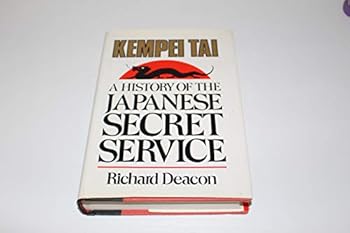Kempei Tai: A History of the Japanese Secret Service
Select Format
Select Condition 
Book Overview
Story about the Japanese Secret Service. This description may be from another edition of this product.
Format:Hardcover
Language:English
ISBN:0825301319
ISBN13:9780825301315
Release Date:January 1983
Publisher:Beaufort Books
Length:306 Pages
Weight:1.20 lbs.
Customer Reviews
1 rating
A View of Japanese History
Published by Thriftbooks.com User , 20 years ago
The Kempei Tai were the Japanese Military Police, and were responsible for internal security (like the FBI or British MI-5). Spying was not considered dishonorable: an aristocrat could work as a laborer to carry out a mission (p.16). The Japanese learned that the apparent honesty of Westerners cloaked devious purposes and selfish aims (p.22). The 19th century brought threats to Japan from the imperialism of America, Britain, France, and Russia (p.31). Japan was able to resist and remained independent, built up an army and navy, and gathered intelligence from Western nations. They studied military factories and ship builders, and early on learned about inefficient production in the West (p.33). The Japanese government kept tight control over industries handling military contracts. Students were sent abroad to learn and gather intelligence legally (p.34). They also created secret societies to gather intelligence from these volunteers. One well-tried method to gather intelligence was to operate bordellos (blackmail, bribery). The Black Dragon Society was founded to oppose Russians in Manchuria. Japan signed a Treaty of Alliance with Britain in 1902.The Russo-Japanese War began with the massive advance intelligence operations of Japan (p.52). Japan severed diplomatic relations and then attacked the Russian ships at Port Arthur (p.59). Some of their spies were trumped by Russian counter-intelligence (p.61). Japan later entered into an alliance with Britain, France, and Russia for WW I (p.92); they captured German colonies in the Pacific (p.95). Japan tried to save the Romanovs (p.112) and began conflicts with the Bolsheviks. American pressure on Britain put an end to the Anglo-Japanese Alliance (p.122). Now Japan turned to Germany, its only possible ally (p.123). Japan now began to move in on a divided China, like Western countries (p.129). Japan even sought to settle Jews in Manchuria (pp.145-6).The "Thought Police" were created in 1927 as part of a national spying system. People were to report any suspicions about their neighbors (p.158). The Kempei Tai created a secret society to eliminate all parliamentary political parties and became powerful and feared (p.162). Espionage increased from the Panama Canal north into California in the 1930s. Barber shops were used to collect gossip from US naval personnel! Japan broke off negotiations with America on December 7, 1941. Page 213 tells of plain-language coded messages that used double meanings. A Japanese general could pose as a farm laborer, a captain as a female cook (p.216)! Japanese spies flooded Singapore and Malaysia by 1941. Japan lost the cryptographic war, the Battle of Midway, and WW II. After 1945 the financial and business interests that supported groups like the Black Dragon Society were purged, along with the Communist Party (p.237). Japan spent its limited budget on a "global intelligence gathering system" that provided information on trade, commerce, markets, t







